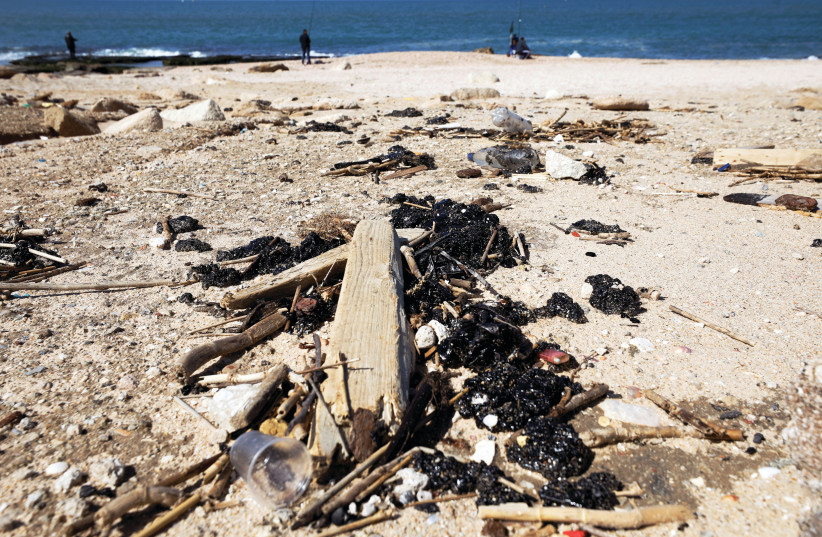Much of Israel’s approximately 200-km. (125-mile) Mediterranean coastline has been contaminated with thick tarballs, and Israelis have been warned to stay away from beaches.

By SHAUL CHOREV MARCH 1, 2021
Massive maritime oil spills have a way of searing our collective memory. For Americans, this trauma was instilled by two incidents: the Exxon Valdez oil spill in Prince William Sound, Alaska, in 1989, and 21 years later, the Deepwater Horizon explosion in the Gulf of Mexico. The French experienced a disastrous oil spill in 1978 with the sinking of the Amoco Cadiz off the coast of Brittany. Now it is Israel’s turn to join this shameful club. But Israel can learn from its current disaster.
While few details of the latest spill are yet publicly known due to a gag order imposed on investigators by a Haifa court, it appears that tar was first noticed accumulating on February 17. The relevant agencies failed to promptly identify the spill, much less contain it. Much of Israel’s approximately 200-km. (125-mile) Mediterranean coastline has been contaminated with thick tar balls, and Israelis have been warned to stay away from beaches. On February 24, the Health Ministry banned the sale of all seafood sourced from the Mediterranean. The ramifications of this oil spill are just beginning to emerge. However, there are important matters that policymakers could, and should, address immediately.
Following the 9/11 terrorist attacks, the phrase “maritime domain awareness” emerged as Americans began to comprehensively reassess maritime security requirements. As a result of a national security presidential directive issued by president George W. Bush in 2004, a “National Plan to Achieve Maritime Domain Awareness” was issued in October 2005. The Department of Homeland Security, formed after 9/11, was tasked with coordinating maritime safety awareness so that a unified US government approach could be adopted.
Personnel in the Israeli Navy have long been taught maritime domain awareness – identifying and understanding all variables related to the sea that could affect security, safety, the economy, and/or the environment. If we were to construct a continuum from maritime domain awareness to maritime domain blindness, Israel’s actions (including inaction), especially since mid-February, fall very much in the blindness camp. Israel has failed to establish the necessary legal framework for its maritime domain or even to define the responsibilities of various governmental agencies. Addressing these two facets will be a critical requirement to prevent another maritime disaster in Israel.
Most of Israel’s trade is conducted by sea, and free passage through the Mediterranean has always been considered a vital Israeli interest. The importance of the Mediterranean grew dramatically with the expansion of Israel’s Exclusive Economic Zone (EEZ), the 2009 discovery of large natural gas reserves and the construction of related infrastructure, and the building of desalination plants along the coastline of Israel. Israel’s maritime domain is vast, and its area is even larger than the territorial area of Israel before 1967.
The 1982 United Nations Convention on the Law of the Sea (UNCLOS) – which applies even to non-signatories, such as Israel – defines the rights and obligations of states in maritime areas. Israel established its EEZ with Cyprus in 2010, and has recently held indirect negotiations with Lebanon, under US auspices, delimiting its maritime border based on UNCLOS principles. A legal opinion issued in January 2013 by Israel’s deputy attorney-general clarified that “Israel accepts upon itself the customary provisions of UNCLOS, including those pertaining to maritime areas.”
SINCE 2017, Israel’s Justice and Energy Ministries have been working to approve a parliamentary bill pertaining to maritime areas, based primarily on principles found in UNCLOS and the 1958 Convention on the Continental Shelf. The draft bill enumerates a number of maritime domain goals, including sovereignty and sovereign rights, law enforcement enhancements, development and proper utilization (including natural resources), and strengthening environmental protections. Yet, as written, the bill would grant the Environmental Protection Ministry only advisory input; the Energy Ministry would have sole control over Israel’s maritime domain, despite the obvious potential for significant environmental implications. Separating the issuance of drilling licenses and environmental monitoring will be highly problematic.
